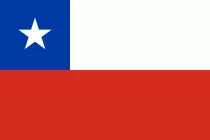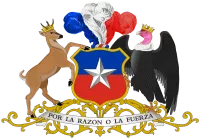Chile

Geographical Location of Chile
Chile is a long and narrow country, like a huge coastline facing the Pacific Ocean to the west. Its length exceeds 4,200 kilometers and its climatic conditions are very diverse. In the north is the driest zone in the world - the Atacama Desert. The climate in the south of the country is cool and rainy, and the nature is similar to that found in the Scandinavian countries with spruce forests, fjords, lakes and archipelagic coasts. The country's climate is also influenced by the Humboldt Current, which makes the interior warmer than coastal areas and brings cold night fog to the steppe lands and deserts in the north.
Since the early 2000s, Chile has made great strides in salmon farming. Unfortunately, this industry has had a negative impact on the environment. The release of chemicals and nutrients from the sites has become a serious problem for seabed fauna and water quality. Another environmental problem in Chile is extensive deforestation. The export of wood products is very profitable and therefore very widespread. Deforestation, combined with industrial emissions and human activities, leads to severe air pollution in cities.
In 2010, Chile was hit by a powerful earthquake that caused a tsunami. The destruction was extensive, with more than 450 people killed.
Brief History of Chile
By placing the Andes as a barricade, nature itself ensured the isolation of the indigenous population of Chile from the rest of the world for a long time. In 1540 the Spaniards arrived and the country became subject to the Viceroyalty of Peru. The Spaniards faced resistance from the local population, but in 1541 they reached the fertile valley of Chile and founded Santiago. A century later, the indigenous population had been halved due to wars against the Spanish and disease from Europe. In 1818, Chile became formally independent from Spain, ushering in a long democratic era. With the exception of two periods of anarchy in the 1830s and 1930s, democracy lasted until 1973.
Salvador Allende was the first democratically elected Marxist president in 1970. By nationalizing the economy, Allende was able to increase wages and purchasing power and reduce unemployment, but his socialist policies scared off investors and capital flowed out of the country. In 1973, Augusto Pinochet staged a coup d'état aimed at suppressing Allende's Marxist policies. Pinochet's reign was characterized by economic growth, but also by brutal repression and a strict dictatorship.
Following major demonstrations and several uprisings, democratic elections were held in 1989. Since then, power has alternated between the two major party alliances; The center-left Concertación alliance and the center-right Chile Vamos alliance. Former President Sebastian Piñera won the 2018 elections and caused bitter discontent among the Chilean population. 2019 was characterized by protests and demonstrations, both peaceful and violent. Demonstrators demanded social and economic justice, as Chile is one of the countries with the highest levels of inequality in the world. A referendum on the new constitution was held in October 2020 and the overwhelming majority voted in favor.
Society and Politics of Chile
Chile is a democratic republic where the president is both head of state and head of government. The country is a unitary state, but has 15 regions and 346 municipalities. The legislative branch is divided into two chambers: the Senate and the Chamber of Deputies. Politics is dominated by two wings: western and right.
Chile is often called one of the most democratic and free countries in South America. Political parties can operate freely, fair democratic elections are held regularly, and freedom of organization and assembly is respected. A corruption scandal in the national police and land conflicts with the Mapuche people have sparked a response, in particular from the UN and human rights activists, who have criticized Chile for this. Investigations into people who violated human rights during the military dictatorship continue.
During a referendum in September, an overwhelming majority voted against the draft of a new progressive constitution. The project included, among other things, the legal right to a healthy climate and environment, and that Chile could become a multinational state. Chilean authorities are in the process of amending the draft.
Economy and Trade of Chile
Chile's economy is one of the most stable and competitive in Latin America. Since colonial times, Chile's economy has been largely based on the export of raw materials from agriculture and mining. Copper is the most important export commodity, and Chile has been the world's leading copper producer since the 1980s. However, in recent years, other products have partially taken over the role of copper. Products such as fruit, wine, timber and fish are important exports today. China, the US, the EU, Peru, Argentina and Brazil are the country's most important trading partners.
The previous military regime resulted in Chile having a relatively large external debt. Debt fell sharply in line with the country's economic growth in the 1990s and 2000s. A well-developed economy and reforms in the financial sector led to Chile becoming the first South American country to be approved as a member of the OECD in 2010. Despite the good economy, unemployment in the country is high, which can be explained, among other things, by the fact that the expansion of the mining sector has not created new jobs as investments have been made in advanced technological tools.







